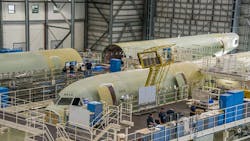Airbus Returns Favor Boosts US Manufacturing
Allan McArtor, Chairman and CEO of Airbus Group Inc. (IW 1000/52) wants the U.S. to know that he’s happy to return a favor. In an op-ed on AL.com, he explained that when his company released its first airplane in 1974, the engines that powered the A300 were built in the United States.
So in 2015 he was glad to boost the U.S. manufacturing sector by opening the company’s first U.S. assembly plant. The U.S. is the largest market in the world for single-aisle aircraft, which is part of the reason Airbus chose Mobile to build its U.S. manufacturing facility.
The $600-million, 53-acre facility at the Mobile Aeroplex at Brookley began assembly in July with first deliveries scheduled to begin in 2016. The facility is expected to produce between 40 and 50 aircraft per year by 2018 – building the A319, A320 and A321 versions from Airbus’ single-aisle family of jetliners.
McArtor not only wants to give back to the U.S. he wants Airbus to be an active contributor to a sector that is on the road to recovering what it lost during the recession. McArtor points out that in 1974 there were 18 million Americans employed in manufacturing. In 2015 that number had dropped to 12 million. However, employment is on the upswing with 800,000 jobs added since 2010.
His company is adding to that growth. “In addition to our investment of more than half a billion dollars in Mobile, in 2014 we bought goods and services in the U.S. worth $15.9 billion to build our fleet of commercial aircraft (that number jumps to $16.5 billion when you add our helicopter, space and defense products),” McArtor said. Airbus aircraft has a very high percentage of parts and avionics that are made in America.
Since 1990, Airbus has spent $170 billion with U.S based suppliers. "That translates into Airbus supporting over 260,000 U.S. manufacturing jobs last year, according to a U.S. Department of Commerce formula,“ says McArtor.
And the company has the goal of increasing procurement from U.S. suppliers in more than 40 states to $20 plus billion in the coming years.
His commitment to the U.S. market is strong. “Every Airbus plane ever built was produced with American know-how. Now, as a sign of our belief in this country, its workers, and its future, Airbus planes will also be produced in America.”
